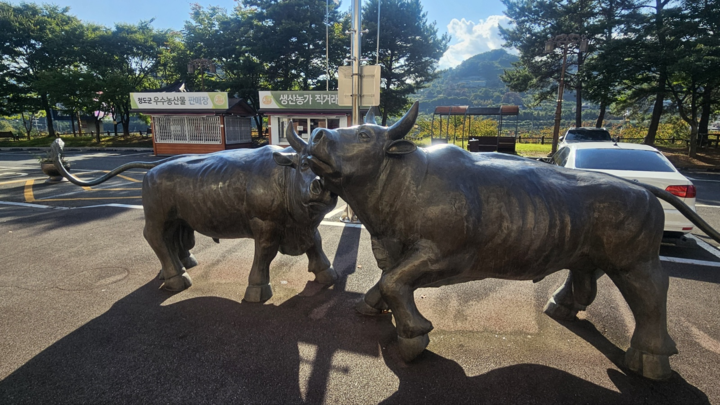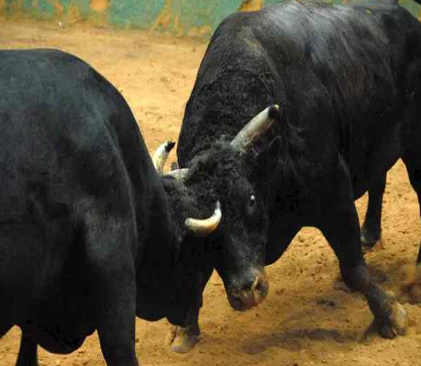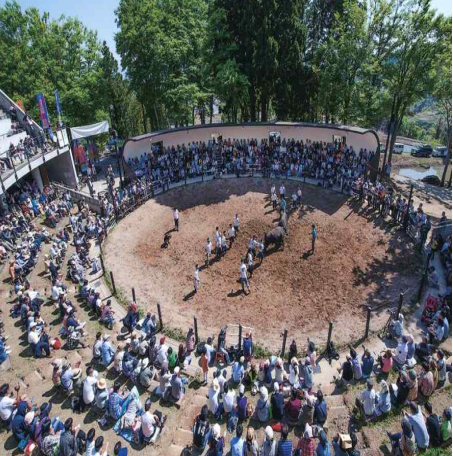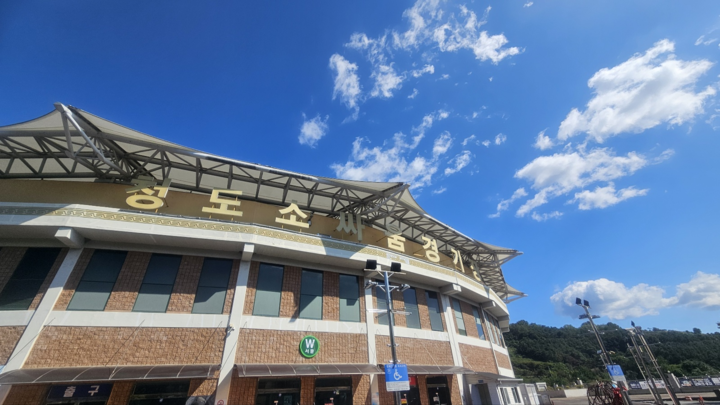Cheongdo emerges as the cultural heart of bullfighting in Korea, balancing heritage and modernization
Ongoing welfare debates and economic revitalization efforts define the future of Cheongdo’s traditional bullfighting

Cheongdo bullfighting, a traditional practice with deep historical roots in Korea, is undergoing a transformation from a regional pastime into a recognized cultural sport. Despite its long legacy, the practice remains unfamiliar to many, yet it steadfastly endures as a symbol of local identity, thanks in part to the strong commitment of the Cheongdo community.
Recently, the Cheongdo Public Enterprise released a research report titled “A Study on Expanding and Realizing Welfare in Traditional Bullfighting,” which explores not only the historical and cultural significance of bullfighting but also provides concrete suggestions for welfare and institutional reforms needed for its advancement. This article, leveraging insights from the report, investigates the present state, challenges, and the socio-economic and cultural value of Cheongdo bullfighting, while considering its prospects as a leading example of Korean traditional culture.
Cheongdo: The Sole Bullfighting Hub of Korea
Cheongdo, located in Hwayang-eup, is regarded as Korea’s bullfighting capital. Its arena, the world’s only dome-shaped venue dedicated exclusively to bullfighting, hosts regular matches on weekends and serves as the centerpiece of an annual festival that has grown since 1999. What began as a folk game has since evolved into an active, year-round cultural event.
Korean bullfighting distinguishes itself through its non-lethal format, where two bulls face off without risk to human competitors and without the expectation of death—unlike Spanish bullfights. There is also potential for the event to be officially recognized as an intangible cultural asset, akin to the bullfighting traditions of Japan’s Niigata and Ehime regions.
In Japan, bouts end when a bull withdraws from exhaustion, with referees ensuring animal safety. As of 2022, bullfighting is practiced in six Japanese prefectures across twelve local governments, with some contests designated as Important Intangible Folk Cultural Assets. In contrast, Spanish corrida traditonally culminates in the killing of the bull, while Portugal’s tourada forbids public killings, illustrating clear distinctions from the Korean model.
The unique, non-lethal nature of Korean bullfighting merits recognition and highlights its suitability for preservation and potential institutionalization as cultural heritage, as in the Japanese case. By contrast, Spain and Portugal’s histories demonstrate the global challenges of reconciling tradition with animal welfare concerns—an ongoing balancing act.
Beyond Accusations of Animal Cruelty: Striving for Balance Between Welfare and Tradition
Despite its strong roots, Cheongdo bullfighting faces persistent criticism over animal welfare, with concerns about injuries during matches and claims of forced participation. Animal rights organizations have argued that the bulls endure unnecessary pain.
The recent research report, however, emphasizes that such challenges are best addressed through systematic reforms rather than outright abolition. Its key recommendations are threefold. First, improvement of rearing and training standards, ensuring that competing bulls receive regulated care, adequate rest, and proper nutrition to prevent exhaustion. Second, reinforcing safety during matches by matching bulls by weight and size to avoid uneven contests, and codifying immediate intervention and treatment in case of injuries. Third, establishing comprehensive post-match care, including supporting health checks and recovery upon returning the bulls to their farms, to minimize welfare concerns.
Importantly, fighting bulls are not seen merely as fighting tools; they are cherished members of farming households, often forming close bonds with their owners. This reality complicates the simplistic classification of bullfighting as animal cruelty.
International precedents strengthen the rationale for these recommendations. For instance, in the yamakoshi “tsunotsuki” (horn butting) tradition of Niigata, Japan, designated Important Intangible Folk Cultural Asset, handlers known as seko carefully manage the bulls using ropes and batons, halting matches when safety is at risk—highlighting the coexistence of heritage recognition and welfare management.


In stark contrast, Spanish bullfighting, rooted in ritualized killing, faces mounting international censure on animal welfare grounds. The fact that Cheongdo bullfighting fundamentally operates without lethal consequences suggests that Korea’s model, especially if paired with systemized welfare measures similar to Japan’s, could achieve an ideal equilibrium between tradition and modern ethical standards.
The report ultimately asserts that, with enhanced management and welfare measures, Cheongdo bullfighting could stand as an exemplary case of responsible cultural heritage in the international arena.
Driving Regional Economy and Supporting Traditional Culture
Cheongdo bullfighting is both a cultural tradition and a major catalyst for the local economy. In 2024 alone, the Cheongdo bullfighting arena hosted 1,224 matches over 102 days across 51 rounds, drawing approximately 390,000 spectators and generating 30.4 billion KRW in revenue. Spectator numbers, which declined during the COVID-19 pandemic, have since rebounded, underscoring the enduring economic impact of the event.
The benefits extend beyond the arena itself. Festivals and tournaments revitalize traditional markets, drive consumption of local specialties such as premium Korean beef, persimmons, and wine, and bolster the hospitality and food industries, invigorating the entire regional economy.
To ensure a sustainable future, the report recommends that Cheongdo bullfighting pursue official cultural heritage designation, integrate more closely with tourism and festivities, and secure national policy support. Only by merging preservation with contemporary cultural and economic value can Cheongdo bullfighting solidify its status as a flagship Korean cultural brand.
Standing at a Crossroads: Tradition, Welfare, and Branding
Cheongdo bullfighting is now at a pivotal juncture. By moving beyond debates over animal cruelty to realize harmony between welfare and heritage—and by implementing strategies for industrialization and branding—Cheongdo can transform itself from the “home of bullfighting” into a premier cultural city emblematic of Korea.
From Tradition to the Future
Cheongdo bullfighting epitomizes a distinct tradition that continues to sustain local communities. With forward-thinking welfare and regulatory improvements, bullfighting can be recognized not as a site of cruelty but as a cultural heritage of international repute.
The roar of the crowd in Cheongdo’s arena is both a bridge between the past and present and a portent of Korea’s cultural future. The task now is to foster this unique legacy into a sustainable and proud cultural asset. Rather than a relic to be discarded, Cheongdo bullfighting deserves to be safeguarded as a valuable pillar of Korean heritage.
Note “This article was translated from the original Korean version using AI assistance, and subsequently edited by a native-speaking journalist.”

Photo=MHN DB, Cheongdo Public Enterprise
추천 뉴스
- 1 Overcoming Paralysis and Rare Disease: The Miraculous Journey of Sae-wook Yang and Yoon-hee Won Featured on Human Theater A remarkable story of overcoming physical limitations and embracing life in spite of rare illness is set to move viewers in the upcoming broadcast of KBS’s “Human Theater” on September 3.The episode shines a spotlight on Sae-wook Yang, 33, who was paralyzed from the waist down at the age of 23 after
- 2 Korean Men's Volleyball Team Returns to World Championship After 11 Years, Highlighted by FIVB for Strategic Shifts The Korean Men's National Volleyball Team is returning to the FIVB World Championship stage after an 11-year absence, drawing international attention with a feature on the official website of the International Volleyball Federation (FIVB).On September 2, the FIVB published an article noting that Kor
- 3 Seoul Policy Lacks Clear Direction as Experts Call for Return to Fundamentals Calls for a structural overhaul of Seoul's transportation and urban policies gained renewed attention at a recent forum, where experts stressed the necessity for the city to move away from service-focused development and adopt more sustainable, ecological approaches.At a seminar hosted on September
- 4 Different Paths to Independence: How Asian Nations Mark Their Own Post-War Days On September 2, as Russian President Vladimir Putin and Chinese President Xi Jinping held a summit, Vietnam celebrated its own Independence Day. With North Korean leader Kim Jong Un reportedly set to visit China for its Victory Day on September 3, the anniversaries surrounding Japan’s defeat in Worl
- 5 KBL Rookie Draft Set for November 14 at Jamsil Student Gymnasium The Korean Basketball League (KBL) announced that this year’s rookie tryouts and player selection event—the highly anticipated KBL Rookie Draft—will take place on November 14 at the Jamsil Student Gymnasium in Seoul.Players who wish to declare for the rookie draft must submit their application forms
- 6 16 New Go Players Embark on Professional Careers at Joint Induction Ceremony Sixteen rising stars who are expected to invigorate the Korean Go scene have officially started their professional journeys, following a joint induction ceremony.On September 1, the Korea Baduk Association held its official certification event for its newest cohort of professional players at its hea
- 7 Son Heung-min Expresses Disappointment After LAFC's Home Debut Defeat Son Heung-min expressed deep disappointment following LAFC's 2-1 comeback defeat against San Diego FC at home on August 31 (local time), where he was unable to score in his much-anticipated home debut.During a post-match press conference, Son said, “Today was truly a special day, and the support fro
- 8 Son Heung-min Returns as National Squad Heads to US for World Cup Preparations As the 2026 FIFA World Cup in North and Central America draws closer, the South Korean national football team has departed for the United States to begin full-scale preparations.Having secured a spot at the upcoming World Cup, the national team flew out from Incheon International Airport on Septembe
- 9 Kim Won-ho and Seo Seung-jae Clinch Gold as Korea Shines at World Badminton Championships The Korean national badminton team captured one gold medal and one bronze at the 2025 BWF World Championships, which concluded on September 1 at adidas Arena in Paris, France.In a commanding performance, the world’s top-ranked men’s doubles pair, Kim Won-ho and Seo Seung-jae, defeated China’s Chen B
- 10 LG Twins Set New Monthly Win Record in August, Edging Closer to Championship The LG Twins of the 2025 Shinhan SOL Bank KBO League capped off August with an impressive 18 wins, 1 draw, and 6 losses, setting a new club record for most monthly victories.By August 30, the Twins had already surpassed their previous best from May 1994, finishing at 18 wins, 1 draw, and 5 losses be
